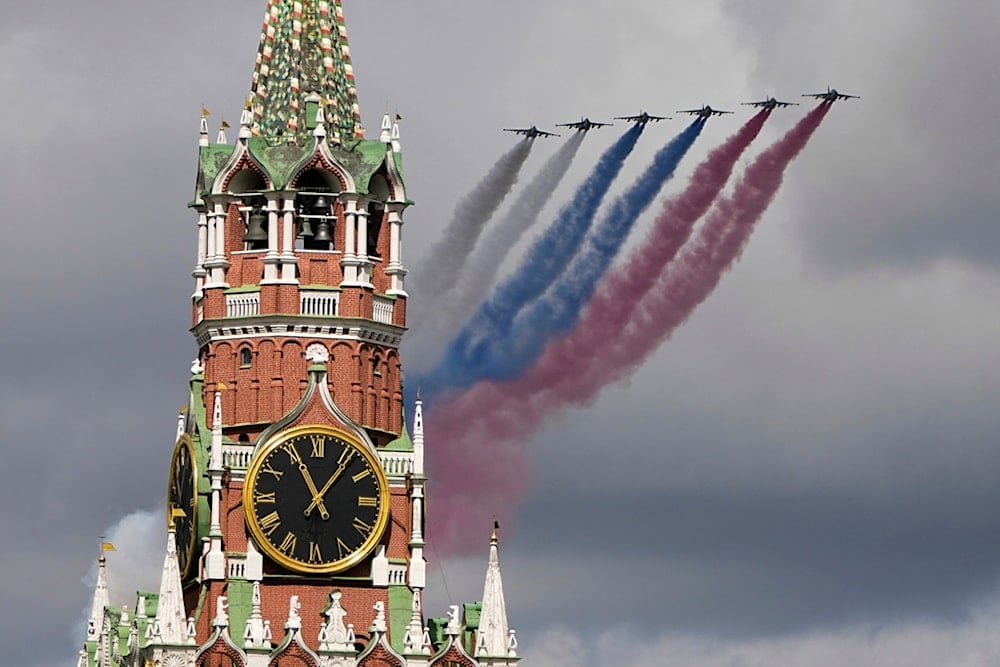Moscow warns it may strike NATO bases over Western long-range weapons
Russia has warned it may strike military facilities in NATO countries that permit Ukrainian deep-strike attacks using Western-supplied weapons, following a UK-Germany defense pact to jointly deliver long-range systems to Kiev.
-

Russian Air Force Su-25 jets fly over Red Square leaving trails of smoke in the colors of the Russian national flag during the Victory Day military parade rehearsal with the Spasskaya Tower in Moscow, Russia, on Monday, May 5, 2025, marking the 80th anniversary of the end of World War II. (AP Photo/Alexander Zemlianichenko)
Russia has issued its starkest warning yet in response to mounting Western military support for Ukraine, signaling its willingness to target military infrastructure in countries that enable Kiev to strike deep into Russian territory with long-range weapons.
"Russia considers itself entitled to use its weapons against the military installations of those countries that will allow its [long-range] weapons to be used against Russia," Foreign Ministry spokesperson Maria Zakharova declared Thursday during a press briefing in Moscow. "If the conflict escalates further, we will respond decisively and in a symmetrical manner."
Missile pact
Zakharova's statement follows the landmark defense agreement signed earlier the same day by Germany and the United Kingdom, under which the two countries will jointly deliver advanced long-range weapon systems to Ukraine. The weapons, developed through Anglo-German industrial cooperation, are set to begin arriving in Ukraine within weeks and are explicitly intended to enhance Ukraine's capacity for deep-strike operations, a shift that Russia views as a direct threat to its national security.
Under the Kensington Treaty, Berlin has pledged over €5 billion in support and removed previous restrictions preventing German-made weapons from being used on Russian soil. The treaty also envisions future development of next-generation strike systems with ranges exceeding 2,000 kilometers.
At a signing ceremony in London, UK Prime Minister Keir Starmer and German Chancellor Friedrich Merz framed the pact as a "historic" deepening of bilateral defense ties. "Ukraine will soon receive significant additional support in this area, including through the industrial cooperation that we have established with Ukraine," Merz noted.
Red line warning
Russia, however, views this expanding military assistance, and the lifting of targeting limitations, as crossing a dangerous red line. Zakharova also condemned recent remarks by German Defense Minister Boris Pistorius, who told the Financial Times that German troops should be prepared to kill Russian soldiers if deterrence fails.
"They have simply become brutal. Which NATO member was or is Russia planning to attack?" Zakharova asked. "It was NATO members in their previous state, position, and previous formation that attacked our country. Pistorius and his ilk have already been told more than once by us at the highest level that we were not planning to attack NATO countries."
Read more: Russia warns NATO plans to turn Moldova into military foothold
Her comments come amid parallel reports of European proposals to create a "coalition of the willing" for deployment to Ukraine. Zakharova warned that such a force, under any flag, would be treated as a hostile military presence.
"We have repeatedly stated that the deployment of armed forces of other states under any flag is absolutely unacceptable. We regard this as preparation for foreign intervention. We will consider the so-called multinational forces as legitimate military targets," she warned.

 3 Min Read
3 Min Read











